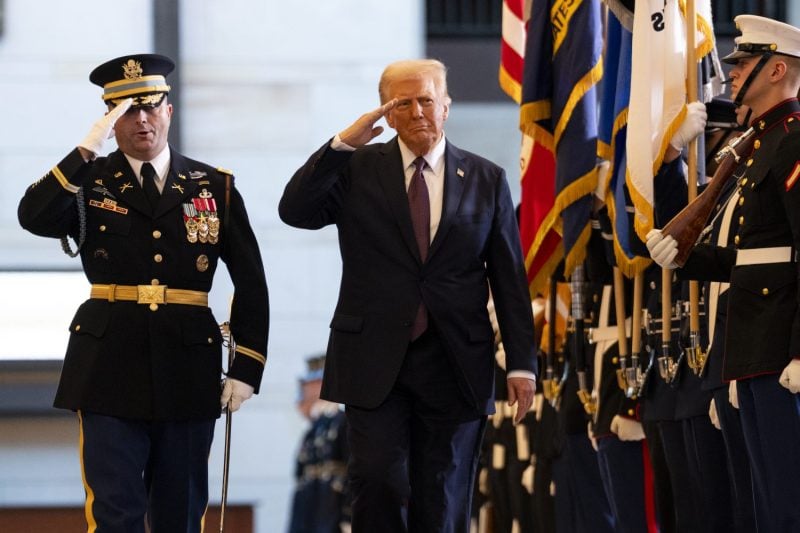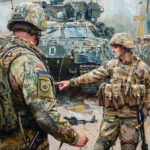America Under Trump Is the Realists’ Grand Experiment

America Under Trump Is the Realists’ Grand Experiment
This administration will leave an indelible mark on how international relations is taught for a generation to come.
U.S. President Donald Trump reviews the troops in the U.S. Capitol during his inauguration ceremony in Washington on Jan. 20. Greg Nash-Pool/Getty Images
Take a seat in almost any introduction to international relations course at a U.S. university, and you’ll probably catch an opening lecture on the “Melian Dialogue” from Thucydides’s famed history of the Peloponnesian War. In it, the Athenians put a simple proposition to the people of neutral Melos: Surrender or face destruction. The weaker Melians make a series of arguments—about alliances, morality, and the gods—in hopes of changing the Athenians’ minds, but to no avail. In the end, the Melians choose to resist and meet their fate. From there, Thucydides draws his famous dictum: “The strong do what they can and the weak suffer what they must.”
Thucydides is the intellectual godfather of the school of international relations theory known as realism. Realism holds that states are motivated purely by self-interest and that power matters above all else. In the college classroom, the Melian Dialogue raises a fundamental question about international relations: Does Thucydides describe how the world was in the past—or how it still is today?
Take a seat in almost any introduction to international relations course at a U.S. university, and you’ll probably catch an opening lecture on the “Melian Dialogue” from Thucydides’s famed history of the Peloponnesian War. In it, the Athenians put a simple proposition to the people of neutral Melos: Surrender or face destruction. The weaker Melians make a series of arguments—about alliances, morality, and the gods—in hopes of changing the Athenians’ minds, but to no avail. In the end, the Melians choose to resist and meet their fate. From there, Thucydides draws his famous dictum: “The strong do what they can and the weak suffer what they must.”
Thucydides is the intellectual godfather of the school of international relations theory known as realism. Realism holds that states are motivated purely by self-interest and that power matters above all else. In the college classroom, the Melian Dialogue raises a fundamental question about international relations: Does Thucydides describe how the world was in the past—or how it still is today?
The United States and its adversaries are running a new experiment on this question in real time, testing whether a foreign policy based strictly on self-interest and implemented almost exclusively through power politics is beneficial—or even feasible—in the modern era.
Of course, power politics never went away. But competition between great powers today is markedly different from what it was in the 20th century. The ideological battle lines dividing communism, fascism, and liberal democracy during World War II and the Cold War have faded into the background, even if the geopolitical battle lines very much remain. Today’s world looks post-ideological: Ostensibly communist China has shed its ideological roots in favor of a hybrid system of capitalism and authoritarianism. Much the same holds for post-Soviet Russia since its failed transition to democracy—it is an authoritarian government with a veneer of elections. According to Freedom House, strongman politics have been on the rise around the globe for two decades.
More recently, though, ideologically infused foreign policy is also on the decline in the United States.
Historically, Washington has always blended realism with idealism. President Franklin D. Roosevelt predicated his foreign policy on “a world founded upon four essential human freedoms.” Ronald Reagan cast the struggle against the Soviet Union as a battle of freedom and democracy versus the “evil empire.” George W. Bush placed a “freedom agenda” at the core of his foreign policy.
But realpolitik necessities often interfered with adherence to lofty American rhetoric. Roosevelt worked with Soviet dictator Joseph Stalin to win World War II. Reagan supported authoritarian countries to win the Cold War. The Bush administration cut deals with autocratic leaders in pursuit of its so-called global war on terrorism.
Even U.S. support for Ukraine combined idealism and realism. The Biden administration justified its military support to Ukraine after Russia’s full-scale invasion as fending off “blatant attacks on liberty and democracy,” but it was classic power politics, too. While some realist academics pinned the blame for the war squarely on Western liberal delusions, the idea that states will act to protect their own security—in this case, by coming to Ukraine’s defense against Russia’s desire to expand its boundaries in Europe—is classic realism.
Washington’s methods, too, have been conflicted. The United States certainly has been willing to wield “a big stick”; it has been either directly at war or engaged in proxy wars on five continents almost continuously for the past century. The United States’ use of nonmilitary coercion—particularly economic sanctions—has similarly exploded, increasing more than ninefold since the start of the 21st century.
Still, the United States historically tempered these punitive measures with “soft power”—the term popularized by Harvard professor Joseph Nye for the ability to convince and co-opt rather than coerce states to do one’s bidding. The United States spent, on average, a little more than 1 percent of its federal budget annually on foreign aid over the past quarter-century, but that made it the largest donor country in the world and bought it a great deal of soft power.
To further legitimize its actions and promote its vision for a rules-based, liberal international order, the United States often worked through multilateral institutions. In the aftermath of World War II, it spearheaded the creation of the cornerstones of the current international order—including the United Nations, the International Monetary Fund, the World Bank, NATO, and other institutions and alliances. While the United States was careful to retain veto power over these organizations and would bypass them if it felt its core national interests were at stake (see the Iraq War), it still invested significant time and effort softening power politics with genuine multilateralism.
The new Trump administration, by contrast, is pursuing a purely realist approach to foreign policy. Trump’s former advisors, scholars, and journalists alike all describe the administration in this way. Key national security roles are staffed by self-described realists. Some who previously advocated for a more values-based foreign policy—including U.S. Secretary of State Marco Rubio—have since changed their position.
As if drawing a page from realist theory, “America First” revolves first and foremost around self-interest. The administration has expressed varying degrees of skepticism around most multilateral institutions—from the United Nations to NATO. Many of the major foreign-policy moves—from the Middle East to Europe and conflict negotiations to international economics—have dropped even a veneer of multilateralism.
The administration has replaced idealism with a form of realist transactionalism, where every action must tie back to what it sees as U.S. self-interest. The United States will support Ukraine, but only if it agrees to concessions to Russia and signs a minerals deal. The United States says it will uphold NATO treaty guarantees, but only if Europe spends more on defense. The United States lifted tariffs on Mexico and Canada, but only after those countries promised to staunch fentanyl smuggling and illegal immigration.
Further, the administration relied more on sticks than on carrots. It dismantled the U.S. Agency for International Development, cut 83 percent of foreign aid funding and ordered the shuttering of U.S. Agency for Global Media (the parent organization of Voice of America and others). In its place, it has relied more heavily on tariffs—against allies and adversaries alike—and at least regarding terrorist groups such as Hamas and Houthis, the threats or the actual use of force.
How will this experiment in realism play out? Some indicators will arrive quickly, such as whether trade imbalances are resolved, defense spending in Europe increases, and the wars in Ukraine and the Middle East end. The Trump administration’s approach notched a couple of early victories—helping to bring about a long-awaited, if impermanent, cease-fire deal in the ongoing Israel-Hamas war just a day before Trump took office, enhanced immigration and drug enforcement on the Mexico and Canadian borders, and the sale of Chinese interests in ports around the Panama Canal.
A core tenet of realism is that states look first and foremost to their own security, and therefore try to “balance”—equalize power—against their rival states, or at least the threatening ones. Long before the second Trump administration, a slew of U.S. adversaries—China first and foremost, but also Russia, Iran, and North Korea—already were trying to counter Washington’s power, much like realism suggests.
The question today, though, is whether the United States’ new foreign-policy realism will provoke further balancing behavior—perhaps even by Washington’s traditional allies and partners, which hitherto thought of the United States as a benign, if not positive, force on the global stage and which must now fend for themselves.
That might be an actual plus for some realists who have long pushed for a more restrained U.S. foreign policy. But if these states then use their new autonomy to pursue objectives that run counter to U.S. interests, then the outcome could be a net negative.
The ultimate question, however, is whether this experiment in realism produces a world that leaves the United States stronger, more prosperous, and more secure. And here, even some realists now have their doubts. After all, without the guardrails of an international order, the world returns to Hobbesian anarchy. And that’s not a particularly attractive place to live.
If ancient history is any guide, then we may not know for some time to come whether this turn to hard-nosed realism pays off. In the short run, power politics favored the Athenians. Melos was brought to its knees. The Athenians, Thucydides tells us, “put to death all the grown men whom they took, and sold the women and children for slaves, and subsequently sent out five hundred colonists and inhabited the place themselves.” In the long run, though, the answer is less clear. After all, it was Sparta that won the Peloponnesian War, and Athens—once the center of arts, culture, trade, and a vast empire—never regained its former glory.
One thing, though, is certain: The realists’ grand experiment will leave an indelible mark on how international relations is taught for a generation to come.
This post is part of FP’s ongoing coverage of the Trump administration. Follow along here.
Raphael S. Cohen is the director of the Strategy and Doctrine Program at the Rand Corporation’s Project Air Force and the director of the National Security Program at the Pardee Rand Graduate School.
More from Foreign Policy
-

American flags are draped around tables and pipes in a small factory room as women work at sewing machines to produce them. Tariffs Can Actually Work—if Only Trump Understood How
Smart trade policy could help restore jobs, but the president’s carpet-bomb approach portends disaster.
-

Donald Trump looks up as he sits beside China’s President Xi Jinping during a tour of the Forbidden City in Beijing on Nov. 8, 2017. Asia Is Getting Dangerously Unbalanced
The Trump administration continues to create headlines, but the real story may be elsewhere.
-

Trump announces tariffs Trump’s Wanton Tariffs Will Shatter the World Economy
Economic warfare is also a test for U.S. democracy.
-

The Department of Education building in Washington, DC on March 24. Why Republicans Hate the Education Department
Broad popular support means that even Ronald Reagan failed at dismantling the agency.









Join the Conversation
Commenting on this and other recent articles is just one benefit of a Foreign Policy subscription.
Already a subscriber?
.
Subscribe
Subscribe
View Comments
Join the Conversation
Join the conversation on this and other recent Foreign Policy articles when you subscribe now.
Subscribe
Subscribe
Not your account?
View Comments
Join the Conversation
Please follow our comment guidelines, stay on topic, and be civil, courteous, and respectful of others’ beliefs.
Change your username |
Log out
Change your username:
CANCEL
Confirm your username to get started.
The default username below has been generated using the first name and last initial on your FP subscriber account. Usernames may be updated at any time and must not contain inappropriate or offensive language.